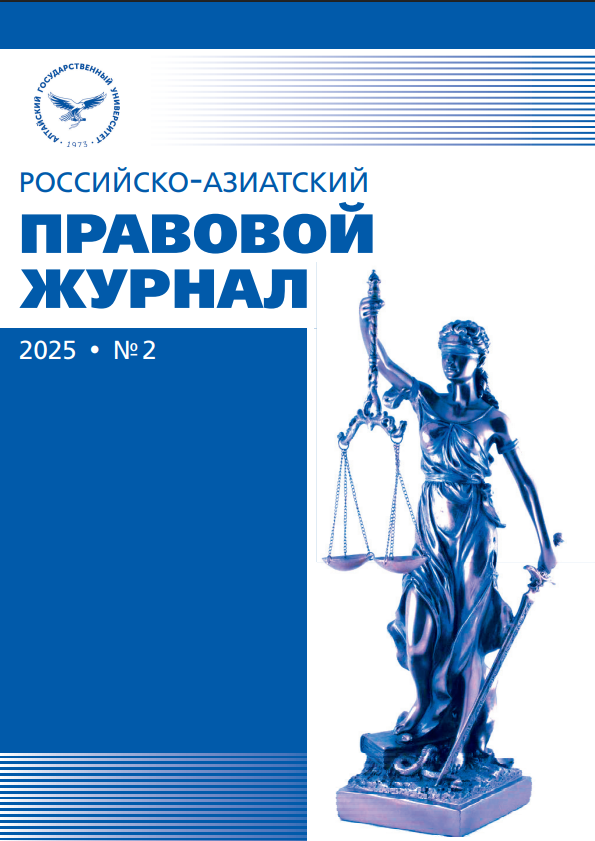ON THE TRADITIONAL (RELIGIOUS) APPROACH TO THE INTERPRETATION OF THE ESSENCE AND VALUE OF LAW
УДК 340.11 ББК 67.01
Abstract
The question of traditional (religious) approach to understanding the essence and value of law (formallaw) is considered. The necessity of in-depth and unhurried study of theological and philosophical texts thatreveal the purpose of the state and the law in public life is emphasized. It is grounded that following the “spiritof law” does not mean denying the “letter of the law”; there should be a general attitude — if the claims aremoral and just, but it is necessary to realize them without violating the legal form required by the law.
Downloads
References
2. Ключевский В.О. Русская история. Полный курс лекций : в 3-х книгах. Кн. 2. М., 1993.
3. Байтин М.И. Сущность права (Современное нормативное правопонимание на грани двух веков). Саратов : СГАП, 2001.
4. Варламова Н.В. Тип правопонимания как теоретическая парадигма интерпретации права // Правовые идеи и институты в историко-теоретическом дискурсе. М. : 2008.
5. Бахтин М. Эстетика словесного творчества. М. : Искусство, 1986.
6. Ириней Лионский. Обличение и опровержение лжеименного знания (Против ересей). Гл. 24. URL: https://azbyka.ru/otechnik/Irinej_Lionskij/protiv-eresej/5_24 (дата обращения: 31.10.2024).
7. Летопись временных лет. СПб. : Наука, 1999. С. 194.
8. Основы социальной концепции Русской Православной церкви. URL: https://azbyka.ru/otechnik/ dokumenty/osnovy-sotsialnoj-kontseptsii-russkoj-pravoslavnoj-tserkvi/#0_3 (дата обращения: 31.10.2024).
9. Маркс К. Заметки о новейшей прусской цензурной инструкции / К. Маркс, Ф. Энгельс. Соч. 2-е издание. Т. 1. М. : «Политиздат», 1955.
10. Соловьев В.С. Оправдание добра. Нравственная философия. Сочинения в 2 т. М., 1988. Т. 1.
11. Паскаль Б. Мысли. СПб. : Азбука-классика, 2005.
12. Кистяковский Б.А. В защиту права (Интеллигенция и правосознание) // Вехи. Интеллигенция в России. Сборники статей 1909–1910. М. : «Молодая гвардия», 1991.
13. Толстой Л.Н. Письмо студенту о праве. URL: http://az.lib.ru/t/tolstoj_lew_nikolaewich (дата обращения: 31.10.2024).
14. Преподобные Оптинские старцы Амвросий и Антоний. Наставления. М. : Изд. Сретенского монастыря, 2003.
15. Левицкий С.А. Свобода и ответственность. М. : Посев, 2003.
16. Хрестоматия по всеобщей истории государства и права. М. : «ТК Велби», 2002.
17. Декарт Р. Сочинения в 2 т. Т. 1. М. : Мысль, 1989.
18. Величко А.М. Нравственные и национальные основы права. СПб. : Изд-во Юридического института, 2002.
REFERENCES
1. Lazarev V.V. Legal Science: Current State, Challenges and Prospects (Reflections of a Theorist) / LEX RUSSICA. February 2013. №2. Vol. LXXV.
2. Kluchevsky V.O. Russian History. Full course of lectures in 3 books. Book 2. M., 1993.
3. Baitin M.I. The Essence of Law (Modern normative legal understanding on the verge of two centuries). Saratov: SGAP, 2001.
4. Varlamova N.V. Type of legal understanding as a theoretical paradigm of law interpretation // Legal ideas and institutions in historical-theoretical discourse. М.: 2008.
5. Bakhtin M. Aesthetics of verbal creativity. M.: Art, 1986.
6. Irenaeus of Lyons. Denunciation and Refutation of False Knowledge (Against Heresies). Ch. 24. URL: https://azbyka.ru/otechnik/Irinej_Lionskij/protiv-eresej/5_24 (access date: 31.10.2024).
7. Chronicle of the Temporal Years. SPb.: Nauka, 1999. P. 194.
8. Fundamentals of the Social Concept of the Russian Orthodox Church. URL: https://azbyka.ru/otechnik/ dokumenty/osnovy-sotsialnoj-kontseptsii-russkoj-pravoslavnoj-tserkvi/#0_3 (access date: 31.10.2024).
9. Marx K. Notes on the newest Prussian censorship instruction // K. Marx, F. Engels Soch. 2nd edition. Т. 1. Vol. 1. M.: Politizdat, 1955.
10. Solov'ev V. S. Justification of the Good. Moral Philosophy: Works in 2 volumes. М., 1988. Т. 1.
11. Pascal B. Thoughts. SPb.: Azbuka-classika, 2005.
12. Kistiakovsky B. A. In defence of the right (Intellectuals and legal consciousness) // Milestones. Intellectuals in Russia. Collections of articles 1909–1910. M.: “Molodaya Gvardiya”, 1991.
13. Tolstoy L.N. Letter to a student about law. URL: http://az.lib.ru/t/tolstoj_lew_nikolaewich (access date: 31.10.2024).
14. Venerable Optina elders Ambrosius and Anthony. Instructions. Moscow: Sretensky Monastery Publishing House, 2003.
15. Levitsky S.A. Freedom and Responsibility. M.: Posev, 2003.
16. Textbook on the General History of State and Law. M.: “TK Velby”, 2002.
17. Descartes R. Works in 2 vols: Т. 1. M.: Mysl, 1989.
18. Velichko A.M. Moral and national foundations of law. SPb.: Izd-vo Yuridicheskiy Institut, 2002.
Copyright (c) 2025 Р. В. Насыров

This work is licensed under a Creative Commons Attribution 4.0 International License.
Russian-Asian Law Journal is a golden publisher, as we allow self-archiving, but most importantly we are fully transparent about your rights.
Authors may present and discuss their findings ahead of publication: at scientific conferences, on preprint servers, in public databases, and in blogs, wikis, tweets, and other informal communication channels.
Russian-Asian Law Journal allows authors to deposit manuscripts (currently under review or those for intended submission) in non-commercial, pre-print servers such as ArXiv.
Authors who publish with this journal agree to the following terms:
- Authors retain copyright and grant the journal right of first publication with the work simultaneously licensed under a Creative Commons Attribution License that allows others to share the work with an acknowledgement of the work's authorship and initial publication in this journal.
- Authors are able to enter into separate, additional contractual arrangements for the non-exclusive distribution of the journal's published version of the work (e.g., post it to an institutional repository or publish it in a book), with an acknowledgement of its initial publication in this journal.
- Authors are permitted and encouraged to post their work online (e.g., in institutional repositories or on their website) prior to and during the submission process, as it can lead to productive exchanges, as well as earlier and greater citation of published work (See The Effect of Open Access).








